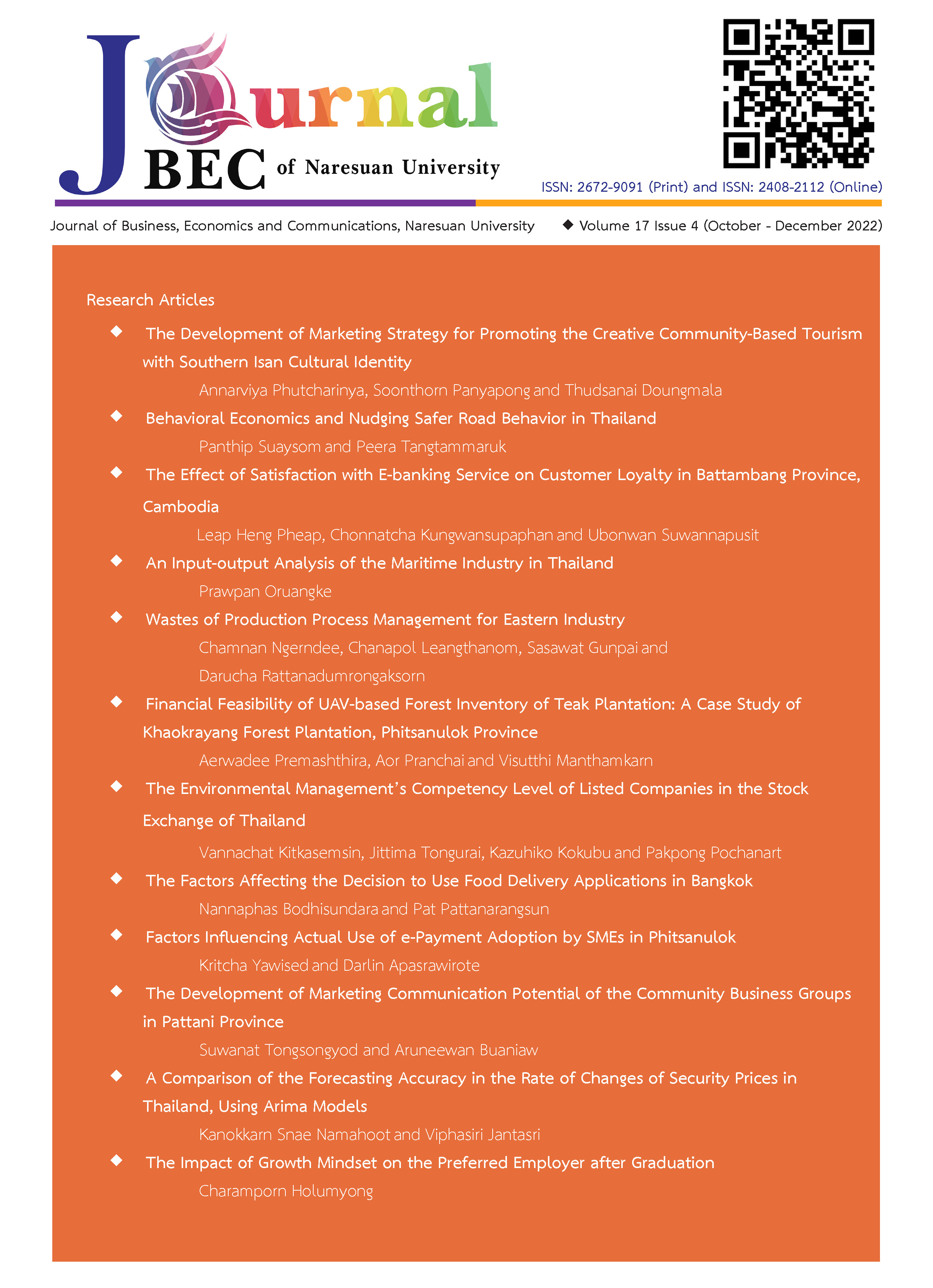The Environmental Management’s Competency Level of Listed Companies in the Stock Exchange of Thailand
Main Article Content
บทคัดย่อ
This work has studied the competency level of environmental management of the listed companies in the stock exchange of Thailand (SET-MAI) in 7-industry groups by analyzing sampling data from closed-end questionnaires from 101 companies collected in 2017 out of the total 596 companies. The results show that the competency level for overall market was at the high level. The highest score was agro & food industry group, and the lowest score was technology group. The industrial group of the market gained the closest scores to the averages of SET-MAI and might be the representative of the listed companies. From the aspect of organization, it was found that sustainable consumption and production as well as environmental reports were the top priorities. In terms of the environmental management process, the factors with highest scores were environmental management, and corporate environmental values and norms. The factors with lowest scores appeared to be environmental management accounting, and environmental relationship with suppliers.
Article Details

อนุญาตภายใต้เงื่อนไข Creative Commons Attribution-NonCommercial-NoDerivatives 4.0 International License.
เอกสารอ้างอิง
Bank of Thailand. (2019a). Key economic indictors. Retrieved November 22, 2019, from https://www.bot.or.th/Thai/Statistics/Indicators/Docs/indicators.pdf
Bank of Thailand. (2019b). Leading economic index and seasonally adjusted components. Retrieved November 22, 2019, from https://www.bot.or.th/App/BTWS_STAT/statistics/BOTWEBSTAT.aspx?reportID=887&language=TH
Barry, M.A. and Rondinelli, D. A. (1998). Proactive corporate environmental management: A new industrial revolution. Academy of Management Perspectives, 12(2), 38-50.
Bartol, K. M. and Martin, D. C. (1997). Management (2nd ed.). New York: McGraw-Hill.
Bunnag, C. (2018). Research coordination for SDGs. Retrieved October 3, 2019, from https://www.sdgmove.com/
Chinpaisan, T. (2016). Organization and management. Bangkok: Thanathatkarnpim.
Griffin, R. W. (2011). Management principles and practices (11th ed.). China: China Translation & Printing Services Limited.
Kiatkrajay, M. and Srijunpetch, S. (2001). Accounting theory: Case study. Bangkok: Faculty of Accounting of Kasetsart University.
Khanna, M. and Speir, C. (2013). Motivations for proactive environmental management. Sustainability, 5(6), 2664-2692.
Kokubu, K., Wu, Q., Nishitani, K., Tongurai, J., and Pochanart, P. (2019). Comprehensive environmental management control system and stakeholder influences: evidence from Thailand. In K. Kokubu and Y. Nagasaka (Eds.), Sustainability management and business strategy in Asia (pp.131-148). Singapore: World Scientific Publishing.
Mahatthanalai, T. (2010). R&D and survival of Thai industry. Horizon Journal, 3(1), 6-7.
Newson, M., and Deegan, C. (2002). Global expectations and their association with corporate social disclosure practices in Australia, Singapore, and South Korea. The International Journal of Accounting, 37, 183-213.
Pimpalai, J. (2012). The study on factors affected to environmental accounting. Retrieved October 3, 2019, from https://doi.nrct.go.th//ListDoi/listDetail?Resolve_DOI=10.14458_DOI=10.14458/DPU.res.2012.5
Principle of Responsible Investment. (2019). The six principles for responsible investment. Retrieved October 3, 2019, from https://www.unpri.org/about-the-pri/about-the-pri/322.article
Sangchai, S. (2016). Environment: ideology politics and sustainable development (2nd ed.). Bangkok: National Institute of Development Administration.
Suttipun, M., and Stanton, P. (2011). Determinates of environmental reporting in corporate annual reports of the Stock Exchange of Thailand (SET). Retrieved November 9,2022, from https://papers.ssrn.com/sol3/papers.cfm?abstract_id=1867823
Suttipun, M. (2012). Environmental disclosures in corporate annual reports: A study of top 50 companies listed in the stock exchange of Thailand. Chulalongkorn Business Review, 34(2), 47–67.
Thaipat Institute. (2019). ESG100 to sustainable investment. Bangkok: Thaipat Institute.
The Stock Exchange of Thailand. (2017). List of SET listed companies & contact information (Excel). Retrieved May 5, 2017, from https://www.set.or.th/en/company/companylist.html
The Stock Exchange of Thailand. (2019a). History of the stock exchange of Thailand. Retrieved October 3, 2019, from https://www.set.or.th/th/about/overview/history_p1.html
The Stock Exchange of Thailand. (2019b). SET classification of industry group and sector. Retrieved October 3, 2019, from https://www.set.or.th/th/regulations/simplified_regulations/industry_sector_p1.html
The Stock Exchange of Thailand. (2019c). SET sustainable stock exchange. Retrieved October 3, 2019, from https://www.set.or.th/th/about/sse/guideline_p1.html
The Stock Exchange of Thailand. (2022). Thailand sustainability investment (THSI) list 2015-2022. Retrieved November 9, 2022, from https://www.setsustainability.com/libraries/761/item/-upload-file-insert-link-
United Nations. (2015). Transforming our world: The 2030 agenda for sustainable development. Retrieved August 18, 2019, from https://sustainabledevelopment.un.org/post2015/transformingourworld/publication
Wheelen, T. L., Hunger, J. D., Hoffman, A. N., and Bamford C. E. (2018). Strategic management and business policy, globalization, innovation and sustainability (5th ed.). United Kingdom: Pearson Education Limited.
Welford, R. (1995). Environmental strategy and sustainable development: The corporate challenge of the 21st Century. New York: Routledge.
Welford, R. (2001). Corporate environmental management1: System and strategies. London: Earthscan Publication.
Welford, R. (1997). Corporate environmental management2: Culture and organizations. London: Earthscan Publication.
Yamane, T. (1967). Statistics: An introductory analysis (2nd ed.). New York: Harper and Row.


